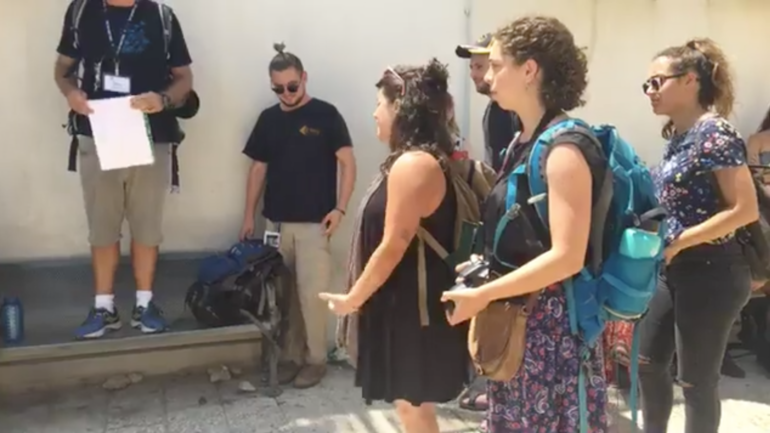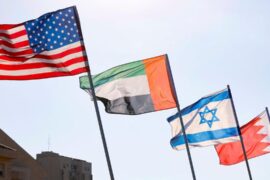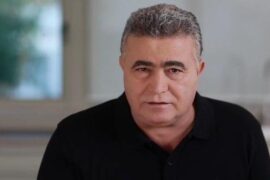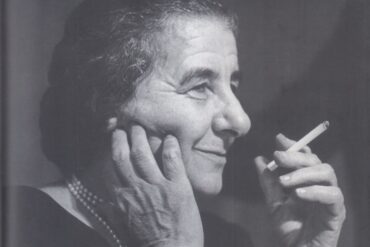A group of eight young Jews from the United States visiting Israel as part of two separate Birthright trips left their tours during a visit to Jerusalem’s ancient City of David on Sunday, choosing to instead pay a solidarity visit to a Palestinian home slated for eviction in the neighborhood.
Once the two Birthright tours arrived at the entrance to the City of David national park, six participants from one tour and two from another announced that they were leaving the group. The eight joined Peace Now activist Ḥagit Ofran for a visit to the Sumarin home.
The Sumarin family, part of Silwan’s Sumarin clan, has been receiving eviction notices from the Jewish National Fund (JNF) since 1991. Israel declared the family home absentee property and later sold it to the JNF, which has been seeking the family’s eviction. The family has filed its own suit but was rejected for failing to provide any proof of ownership or evidence that they had purchased the property.
The Sumarin home is located in the middle of the City of David national park. The Elad organization, which manages the park, is expected to receive control over the property if the Sumarin family is evicted. Two weeks ago another group of five young women from the IfNotNow movement walked off the Birthright trip in favor of a tour of Hebron led by the European-funded Breaking the Silence. According to Birthright-Israel regulations, those who leave the tour cannot return to it.
The group of eight who walked out intend to go see Palestinian life in the West Bank, including a visit to the Khan al-Ahmar Bedouin village slated for demolition and a Breaking the Silence tour of Hebron. Some of the eight walkouts received a message that Birthright intends to cancel their return tickets.
“We think that part of the story is the occupation and unfortunately Birthright will not show us this reality, they try to leave the occupation out of the story,” said one of the participants who left the tour.
26-year-old Becky Wasserman said that “we tried to point during the tour to the fact that they won’t speak to us about the occupation, but we got no answers… It’s really unfortunate because Birthright is often the only opportunity for young Americans to learn about what’s going on.”
Wasserman told journalists that she did not plan to leave the tour when she first arrived, but decided to do so once she realized she was not going to receive honest answers about the occupation or hear the perspective of the Palestinians.
Birthright-Israel released a statement saying: “50,000 young Jews from all over the world have taken part in Birthright so far and it is the leading educational initiative in the Jewish world.”
“Birthright believes in the ability of the participants to formulate their views and opinions themselves. That is why Birthright will not allow groups with any political agenda to sidetrack the plans for the tours. Participants who interfere with the experience of their friends in the groups for any political objectives will forfeit their deposit and their plane ticket.”
Responding to the frustrations of young Diaspora Jews by declaring themselves apolitical completely misses the point. Although this position might have once been the consensus in the mainstream North American Jewish community, choosing to sidestep the conflict has become a strong political position in and of itself. And much like Israel’s military rule over millions of Palestinians in the West Bank, it’s no longer sustainable.
The blame goes far beyond Birthright. By presenting an “apolitical” pro-Israel narrative that doesn’t struggle with the complexities of Israeli society and policies, major American Jewish institutions are quickly making themselves irrelevant to the next generation.
Socially conscious millennials can clearly see that they’ve been denied access to the Palestinian narrative. But they mistakenly believe that they’ve been given the full Jewish narrative. In truth, the shallow pro-Israel education most young Jews receive in North America erases both the Palestinian and Jewish stories. So when young Jews ultimately do engage the Palestinian narrative and hold it up to the shallow Zionist narrative received from the establishment, they naturally resent being misled their whole lives and often come to fully embrace the struggle for Palestinian rights.
But while the generic Palestinian narrative is far more compelling and sophisticated than the generic “apolitical” Zionist narrative being peddled by mainstream Jewish organizations, there exists an even greater narrative that includes the full story of the Jewish people – our incredible struggles, aspirations and historic achievements – as well as the Palestinian story. This larger and more inclusive narrative is what Jewish education needs to pivot towards if it hopes to keep the next generation committed to Israel’s future.
Life isn’t a G-rated film and no one should teach a century-old Middle Eastern conflict as if it is. Rather than sheltering our next generation from the facts and perspectives on both sides that complicate the G-rated Israel fantasy, organizations should expose young adults to all relevant Jewish and Palestinian perspectives in order to offer them the opportunity to more deeply engage.





